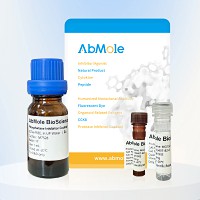
Concanavalin A is a protein containing only β-sheets in its structure, and belongs to the legume lectins family. Concanavalin A stimulates acute hepatic inflammation. Concanavalin A has inhibitory effect on hepatocellular carcinoma by inducing autophagy. It can be used to construct dry eye models, as well as autoimmune hepatitis models.

Cell Mol Life Sci. 2024 Jan 12;81(1):32.
Splenectomy ameliorates liver cirrhosis by restoring the gut microbiota balance
Concanavalin A purchased from AbMole
| CAS Number | 11028-71-0 |
| Solubility (25°C) | Water 5 mg/mL PBS 5 mg/mL |
| Storage |
Powder -20°C 3 years ; 4°C 2 years In solvent -80°C 6 months ; -20°C 1 month |
| Species | Mouse | Rat | Rabbit | Guinea pig | Hamster | Dog |
| Weight (kg) | 0.02 | 0.15 | 1.8 | 0.4 | 0.08 | 10 |
| Body Surface Area (m2) | 0.007 | 0.025 | 0.15 | 0.05 | 0.02 | 0.5 |
| Km factor | 3 | 6 | 12 | 8 | 5 | 20 |
| Animal A (mg/kg) = Animal B (mg/kg) multiplied by | Animal B Km |
| Animal A Km |
For example, to modify the dose of Compound A used for a mouse (20 mg/kg) to a dose based on the BSA for a rat, multiply 20 mg/kg by the Km factor for a mouse and then divide by the Km factor for a rat. This calculation results in a rat equivalent dose for Compound A of 10 mg/kg.
| Related Animal Modeling Products |
|---|
| Astragalus Polysacharin (70%)
Astragalus Polysacharin is a natural product from Astragalus membranaeus, used as adjuvant, attenuates TNF-α-induced insulin resistance by suppressing miR-721 and activating PPAR-γ and PI3K/Akt in 3T3-L1 adipocytes. |
| Myelin Oligodendrocyte Glycoprotein Peptide (35-55), mouse, rat
Myelin Oligodendrocyte Glycoprotein Peptide (35-55), mouse, rat (MOG (35-55)) is a minor component of CNS myelin. |
| PLP (139-151)
PLP (139-151) is amino acid residue 139 to 151 of myelin proteolipid protein (PLP) used to induce experimental autoimmune encephalomyelitis (EAE). |
| G6PI 325-339 (human)
G6PI 325-339 (human) is an efficient inducer of arthritis in B10.Q mice. |
| Heparin sodium salt (MW 15kDa)
Heparin sodium salt (MW 15kDa) is a heparin polymer with a molecular weight of 15kDa.Heparin sodium salt is an anticoagulant that reversibly binds to antithrombin III (ATIII), thereby accelerating the rate of inactivation of Thrombin factor IIa and factor Xa by ATIII. Heparin sodium salt is used for blood collection and plasma preparation in experimental animals and for the construction of parenteral nutrition models in mice. |


Products are for research use only. Not for human use. We do not sell to patients.
© Copyright 2010-2023 AbMole BioScience. All Rights Reserved.
